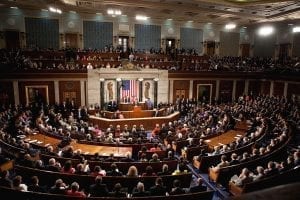With unemployment hitting new highs, many worry that consumers’ credit scores will tank without regulatory action.
While Congress is expediting coronavirus relief for ordinary Americans and big corporations, a coalition of consumer watchdogs are urging action to protect credit scores from an impending financial crisis.
According to The Chicago Sun-Times, the endeavor’s being led by the Consumer Federation of America which includes more than 250 organizations. The Federation is requesting that the government enact a host of score-protection measures, including a lock-down on debt collections and wage garnishment. They’ve also asked for:
- A pause on negative credit reporting for at least four months, so Americans who’ve been laid off or lost their jobs have time to catch up on bills they may not currently be able to pay;
- A nationwide halt on evictions, to last at least a half year. While individual states and counties have already restricted evictions, there no direction at the federal level;
- Outright canceling student loan payments. But as the Sun-Times notes, some legislators, including Sens. Dick Durbin (D-IL) and Tammy Duckworth (D-IL), wants the government to assume responsibility for borrowers’ payments. Durbin and Duckworth are also pressing for a cancelation of at least $10,000 in debt for any and all Americans with outstanding student loans;
- Caps on high-interest loans
There’s a chance that Congress may address some of the Federation’s concerns.
A Senate bill, introduced last week, is forwarding the CFA’s suggestion that negative credit reporting stay off Americans’ reports for the next four months. CNBC says there are similar proposals pending in the House of Representatives.
Sen. Sherrod Brown, an Ohio Democratic co-sponsoring the proposal, said times are rough for everyone—and that Americans shouldn’t have to worry about credit scores amidst a crisis.

“During these uncertain economic times, Americans shouldn’t have to worry about their credit scores as they work to make ends meet,” Brown said in a statement.
But CNBC says initiatives like Brown’s “face an uphill battle,” in large part because lenders rely on great scores to assess risk.
Al Bingham, described by CNBC as a credit expert, told the network that consumers are in a precarious situation.
“I’m sure lots of people are charging up their credit cards buying food and supplies,” Bingham said. “And in the next couple of weeks, we’ll see what lenders decide to do.”
So far, there’s no uniform policy on how banks, credit card companies, and other debt servicers should deal with coronavirus-related financial struggles. Bingham told CNBC that he recommends individuals proactively explore options with servicers, pressing for agreements that’ll keep credit scores safe.
Bingham cautiously recalls how, during the 2008 financial crisis, some lenders let customers skip mortgage payments—but weren’t always clear as to whether those skipped payments might hurt their credit profiles later on.
“Those missed payments were reported to the credit bureaus,” Bingham said. “Anything that changes your payment agreement—whether a forbearance or modification—they have a right to put it on your credit report.”
In the meantime, Americans can look to Congress for some support—the Senate recently passed a $2.2 trillion stimulus. Alongside offering checks to low- and middle-income householders, the bill should bolster unemployment benefits by at least $600 per week.
The proposal, which passed the Senate 96-0, is expected to be approved by the House and President Donald Trump.
Sources
Consumers’ credit also needs protection from COVID-19, consumer group says
How to protect your finances and credit through the coronavirus pandemic
Washington may protect your credit score if your number takes a hit during the coronavirus pandemic


Join the conversation!